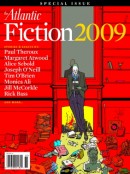 In its new fiction issue, The Atlantic has an alternately charming and frustrating essay by Tim O’Brien about the role of imagination in writing stories.
In its new fiction issue, The Atlantic has an alternately charming and frustrating essay by Tim O’Brien about the role of imagination in writing stories.
Charming because O’Brien builds the piece around his two young sons, and the fact that they’ve recently taken to wearing tails fashioned out of belts, clotheslines, phone cords and whatever else might be at hand. O’Brien and his wife play along (while writing one day, he answers the front door still wearing his), and he wonders if things can go too far:
I’ve tried, God knows, to reason with the boys. I’ve used guile and bribery and shameless deceit. (Santa Claus hates tails.) Last night I tried again. “Pretending can be a good thing,” I told the boys at bedtime, “but sometimes it can get you in trouble. It can be dangerous.” [. . .] “But I thought make-believe was supposed to be fun,” Timmy said.
“Yes, of course it is,” I told him, and then a crucial question occurred to me. “Do you know what pretending is?”
For what seemed a long while, I listened to the whir of a 5-year-old’s mind in motion. “Well, actually,” Timmy finally said, using his favorite (and only) four-syllable word, “actually I guess it’s like when you go away on trips. Sometimes I dream about you. I dream about how you’ll come home from the airport and bring me surprises and play with me. I get sad when you go away, and so I pretend you’re not gone. Is that bad?”
I told him no, it wasn’t bad.
The frustrating part is when O’Brien addresses examples of classic fiction writing. He says:
Although by temperament I’m disposed to what is called “magical realism,” I admire and love the fiction of Dubus and Chekhov and Munro and Cheever and Hemingway and Fitzgerald and many, many other masters of realism.
And then:
Even if one’s goal is to depict ordinary human beings in ordinary human settings, a story must find striking, dramatic, and unexpected ways to accomplish this. . . . Certainly in the work of those masterful realists I listed a moment ago, you will find on virtually every page examples of what I mean by extraordinary human behavior, incidents that surprise and delight.
He goes on to analyze a lengthy paragraph by Borges that is lovely but completely unrealistic. I would have been interested to see O’Brien delve a bit further into the work of those “masters of realism” instead, to illustrate examples of how one turns everyday material into something both recognizable and charged with imagination.

